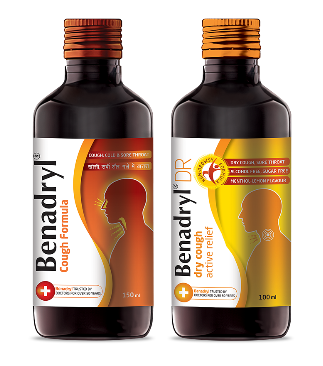DIFFERENCE BETWEEN DRY AND WET COUGH
ARE YOU SUFFERING FROM A COUGH FOR SOME TIME?
A cough is your body's way of responding when something irritates your throat or airways. We cough as a way to protect our lungs. However, Incase your cough persists and does not go away in a few weeks, it Is best to show a doctor

• DID YOU KNOW?
During cough the human brain tells muscles in your chest and abdomen to push air out of your lungs to force out the irritant or foreign body.
HAVE YOU BEEN ASKED BY YOUR DOCTOR ABOUT YOUR COUGH TYPE? HOW WOULD YOU DESCRIBE A DRY COUGH AND HOW IS IT DIFFERENT FROM A WET COUGH?
You may have come across the words wet cough and dry cough. These words are used to describe cough due to different causes:
DRY COUGH:
A type of cough that does not produce mucus is termed as unproductive cough or dry cough. Since, dry cough has a consistent tone it is also called as hacking cough because it is free from the sound of mucus. It is caused by irritation and inflammation of the airway.
WET COUGH:
Cough which produces mucus or phlegm is known as wet or productive cough. This cough sounds ‘wet’ since we end up coughing mucus from the airway while coughing.
LEARNING THE DIFFERENCES BETWEEN A DRY COUGH AND WET COUGH: HERE'S WHAT YOU SHOULD KNOW!
A cough accompanied by a tickling sensation in the throat is usually a dry cough. You can also feel chest tightness after a dry cough. Dry coughs can come after you have an episode of cold, flu or COVID -19. Initially, when you are down with flu or cold you may have a wet cough and during recovery dry cough may linger.
In wet cough, coughing up mucus or phlegm or sputum from the lungs and airways may be due to an illness that has affected your respiratory system. Symptoms such as feeling short of breath can happen if you have built up mucus.
Hence your doctor would evaluate wet cough and dry cough to diagnose an illness responsible for the cough.
WHAT ARE THE CAUSES OF DRY COUGH?
Exposure to allergens or irritants such as smoke, dust, pollen, mold, pet dander, or strong smells (like cleansers or perfumes)
Asthma
Side-effects of medications such as high blood pressure-lowering drugs
Gastroesophageal reflux disease (or GERD)
Croup (in children); it is an infection of respiratory tract where the cough sounds like barking
WHAT ARE THE CAUSES OF WET COUGH?
Cold
Flu
Acute bronchitis
Pneumonia
Postnasal drip (if you experience coughing at night that happens when mucus drips down the back of your throat)
Other medical conditions such as chronic obstructive pulmonary disease (or COPD), cystic or fibrosis
WHAT CAN YOU DO TO RELIEVE OR CONTROL A COUGH?
Drinking water can help soothe cough from throat irritation or dryness. Adding water to the air with a vaporizer, steam inhalation, or having a steamy shower may help relieve cough.
Avoiding smoking and other irritants are also ways to relieve a cough. Those irritants may include medicines, scents (like perfume or candles), or allergens.
For cough associated with gastrointestinal illnesses such as GERD, diet changes along with management of GERD as a condition can help.
While treating a cough your doctor will first determine the cause of the cough. In case of infection, antibiotics may be added.

WHAT MEDICATIONS CAN BE USED IN WET COUGH AND DRY COUGH?
Although there are plenty of over-the-counter cough medications available for treating cough in adults, only your doctor can provide specific advice to treat cough. For a dry cough, syrups containing antitussive medication like dextromethorphan can be prescribed by your doctor to suppress the cough reflex. In wet or productive cough, medications such as expectorants may be given that help thin mucus, and make it easier to cough up sputum.

WHEN TO SEE A DOCTOR?
To diagnose what’s the cause behind your dry cough or wet cough, your doctor may take a medical history, conduct a physical exam, or may ask you to undergo some tests. A cough that doesn’t go away or comes with other symptoms like feeling shortness of breath, mucus production or blood in phlegm could be the sign of a more serious medical problem.
Consider consulting your doctor immediately if you have a persistent cough or you experience coughing with chest pain, choking or vomiting, difficulty in breathing or coughing up bloody or pink-tinged phlegm.